So, how do you develop a recruitment app?
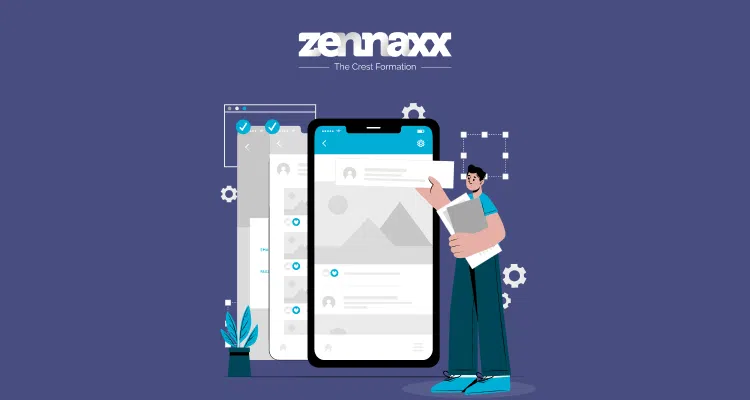
Different Types of Recruitment Apps
Many options are available if you plan to create a recruitment app for your startup. From a job board app to integrated HRM software, you can develop specific apps for your targeted audiences.
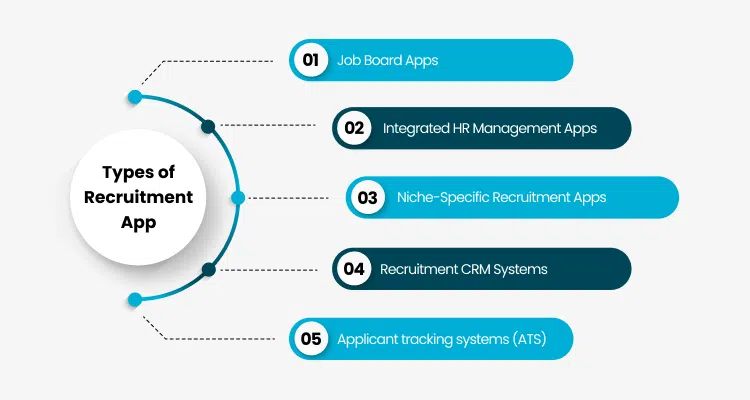
1. Job Board Apps
2. Integrated HR Management Apps
An integrated HR management application automates and simplifies different human resource operations. HR managers can use this app to manage and track employee information.
3. Niche-Specific Recruitment Apps
4. Recruitment CRM Systems
HR managers can use the recruitment CRM app to ensure the candidate experience is better, projecting an enhanced brand image.
5. Applicant tracking systems (ATS)
Features of a Successful Recruitment App
The features of your recruitment app need to align with current market demands. Here are some modern features to consider for your recruitment app development:
1. Smart Resume Parsing
2. Advanced Candidate Search
3. Candidate Sentiment Profiling
4. Rapid Job Posting
5. AI-based Profile Matching
Build customized AI models to help you quickly match related profiles with the job posting. This is one of the innovative features you can add to your recruitment app development process.
6. Candidate Profile Management
7. Video Interviews
8. Admin Dashboard
9. Real-time Job Feeds
10. Applicant Tracking
11. Candidate Data Security
Planning to develop Recruitment app?
Contact us today and let our team of experienced professionals transform your vision into an innovative and user-friendly app that stands out in the market!
Step-by-Step Guide to Building a Recruitment App
Developing a recruitment application requires consideration of security concerns, features, and type of application.
1. Define Key Requirements
2. Plan The Architecture
- Programming Language- PHP, C#, .Net, Dart
- Cloud Platforms- Amazon S3, Amazon EC2
- Frameworks- Angular, Angular Material, NodeJS
- Streaming Protocols- Angular
- Mobile- React Native, Flutter with GetX
- Databases- PostgreSQL, MongoDB
3. Create The Right Development Strategy
Plus, you can adopt a DevOps culture and implement CI/CD pipelines for enhanced deployment. Choosing the right development approach will allow you to reduce the time to market and improve the quality of app delivery.
4. Focus on Business Outcomes
5. Leverage AI-based Automation
Leveraging AI-based automation, you can speed up the development and testing process. It allows you to identify development patterns, environment configurations, and testing results for better performance.
6. Test Rigorously
You can use test automation tools like Selenium and others to ensure rapid tests and reduce manual efforts and costs.
7. Launch and Iterate
This includes launching the application on iOS, Android, and other platforms. Have a constant monitoring mechanism to ensure application performance is up to the mark, even if the user base increases.
After completing the development process, win a structural format to implement the recruitment. It’s time to understand cost estimation for an app development project.
Want to Automate Your Business Process With a Software Solution?
Zennaxx, a leading software development firm in Canada, has delivered 700+ bespoke solutions spanning various industries.
What Does Recruitment App Development Cost?
Developing a recruitment app can cost between $15,000 and $30,000. However, the exact cost estimation depends on multiple factors, including app complexity, engagement models, and the location of the app developers.
For example, hiring a development company with a fixed-cost model can be lower, but there are restrictions.
The location of the development service provider you choose will also impact the cost. For example, the cost of hiring app developers in the USA is higher than in countries like India.
How to Develop a Scalable Recruitment App With Zennaxx?
What features you need, the applications you create, and the approach you choose for development make a difference.
